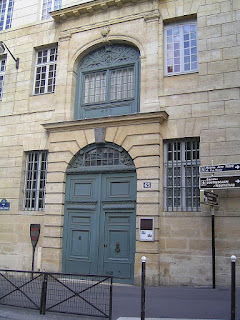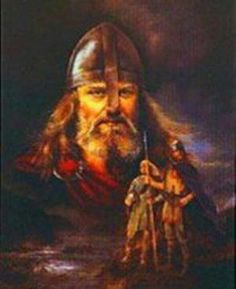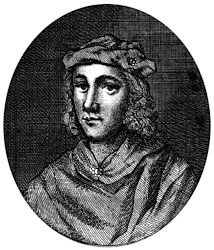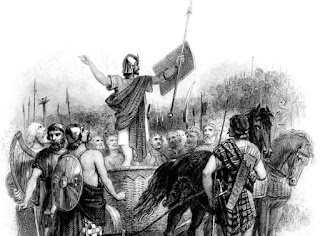The French Connection
The early Thinkers
Scotland's relations with Europe were transformed in the 15th century, when three universities were founded here. St Andrews had the earliest, around 1411, followed by Glasgow 40 years later, and then by one in Aberdeen in 1495. This last one was set up after a plea to Pope Alexander, a member of the notorious Borgia family, but that is another story! The new seat of learning in Aberdeen was called St Mary's first of all, and later named King's College, in honour of James IV.
Such matters apart, the important thing is that, within a very short period, Scots were teaching Scots in Scotland at the highest level available anywhere. And even before those universities, there were the great abbeys, where men of high intellectual calibre were to be found.
For example, Adam Scot, abbot of Dryburgh in the 12th century, wrote extensively about the nature of God, the interpretation of the Bible, and the religious life. Many of his writings survive, but are sadly neglected.
At about the same time, Richard Scot was abbot of the great abbey of St Victor in Paris. And his writings, particularly on the Trinity, had a profound influence on how the Medieval church developed, Richard of St Victor focused on the centrality of love, on God's love for man, and on the commandments that we should love God and our neighbour.
Some decades later, the Order of Friars Minor, the Franciscan Order, was founded. And almost from the start it adopted the stance of Richard Scot. This closely fitted the image of St Francis himself, the man who preached to the birds and animals of the woods and who was seen as in a bond of love with the natural world.
Ever since then, Franciscan theology has borne the marks of Richard Scot's teachings.
At around the beginning of the 13th century. the intellectual scene in Europe came under the influence of Aristotle, the great man of Ancient Greece who, using his reason and not relying at all on divine revelation, constructed a comprehensive system of thought about human beings, the natural world, and higher intelligences.
Christianity found itself confronted with this powerfully-argued system, and had to show either that Aristotle was wrong or that Christianity was compatible with his teachings.
Scots were soon at the forefront of efforts to bring Aristotle's writings to the Christian west, and also to demonstrate that his thought was indeed compatible with Christianity.
In the same century, in 1266 to be exact, or some 30 years after Michael Scott's death, John Duns Scotus, the greatest philosopher Scotland has ever produced, was born in Duns in the Borders. When still young, but already well-grounded in Latin, the language of instruction across Europe, he was taken south by two Franciscan friars.
Duns Scotus taught first at Oxford, then in Paris. In 1307, he went to Cologne but died there a year later. He was a Franciscan who in many built t upon the ideas of Richard Scot of St Victor, particularly about the importance of love in our lives and in the universe.
Indeed, he held that love was a greater thing than knowledge. If we had a choice between loving God without knowing him and knowing God without loving him, it would be better to love than to know, he said.
Duns Scotus, commonly called the subtle doctor, was the great philosopher of freedom in medieval Europe. He taught that our freedom consists in the fact that we are genuinely open to alternative lines of action. Whatever we do, we could in the very same circumstances have done something else instead.
If Scotus is right, then we are more free than we often care to admit, and we have to shoulder responsibility for many acts where we would prefer to excuse ourselves because 'we had no alternative'
A school of Scotists grew rapidly around the teachings of Duns Scotus, and continued to grow after his death. However, during the Renaissance the Scotists were dubbed Dunses (hence dunce) because of their obstinacy and conservatism.
Nevertheless, professorships of philosophy were established in Duns Scotus's name in many European universities, and in the 17th century, the school of Scotus was said to be more numerous than all the other schools put together.
We should remember, too, that Scotus was developing his theories about freedom while the Wars of Independence were being fought in Scotland.
In the 15th century, many Scots studied on the continent, especially at Paris, before taking up teaching posts at the newly-founded universities here. For example, the first rector at St Andrews, Lawrence of Lindores, a Paris-trained philosopher and theologian, whose major extant works, commentaries on Aristotle, are full of interesting material. There is evidence that it was via the writings of Lawrence that an important theory, the impetus theory about the movement of projectiles, came to the attention of the great astronomer Copernicus in Cracow. The theory is historically significant because it foreshadows a crucial concept of modern physics, inertia.
Perhaps the most important Scottish thinker of the 15th century was John Ireland, a student at St Andrews who rose to be rector of the University of Paris before returning to Scotland to become confessor to James III.
In 1490 he completed a book, The Mirror of Wisdom, written in Scots, for the king's son James IV (the King's College man) and intended as a piece of advice to him about the duties of kingship.
The advice was placed in a religious context, in that John Ireland presented God's governance of the world as the best possible model for an earthly king God, he said, advocated a perfect system of laws, is perfectly informed about the obedience or disobedience of his creatures, and recompenses us exactly as justice demands. James IV would be a successful king to the extent that his governance of Scotland corresponded to that model.
The pre-eminent Scottish thinker in the half-century before the Scottish Reformation was John Mair, who was born in Gleghornie near Haddington in 1467. He rose to become a professor of philosophy and theology at Paris, before returning to Scotland in 1518 to take up the principalship of Glasgow University. Then for the last 16 years of his life, he was provost of St Salvator's College in St. Andrews
In Paris, Ignatius Loyola and John Calvin were among the students attending his lectures, and at St Andrews he taught John Knox, a former pupil of Mair's own boyhood school at Haddington.
Some 40 books by Mair are still extant possible all he ever penned. He wrote extensively on logic, theology, moral philosophy, and history. And he had an approach that was all his own. For Instance, his History of Greater Britain. i.e. Scotland and England, was composed in a much more analytic and scientific spirit than can be found in any other Scottish historical work till long after Mair's death.
What comes through clearly is that the book was written by a high-powered logician, who never makes a claim without offering evidence, and who is always sensitive as to just how strong, or otherwise, that particular evidence might be. The History also profited from Mair's study of ethics, for he comments not only on what people did but also on what they ought to have done!
Mair gathered round him a formidable circle of Scottish scholars, such as George Lokert of Ayr, who became prior of the Sorbonne and then dean of Glasgow Cathedral; Robert Galbraith, professor of Roman law at Paris and then senator of the College of Justice in Edinburgh, and William Manderston, successively rector of the universities of Paris and St Andrews.
There were many others. What's notable is how many of the Scots scholars at the university of Paris at the top of their profession-returned to Scotland to enrich the Scottish scene in academe, the church or the law.
They all worked within the broad framework provided by Aristotle, but with other influences too, not least that of Duns Scotus, whom Mair refers to frequently not by name but simply as 'my compatriot' or 'my fellow countryman
In his History of the Reformation in Scotland, John Knox says that the word of John Mair was then held as an oracle on matters of religion. All the same, from Knox's perspective, Mair and his galaxy of thinkers belonged to the Old Order.
With the arrival of the Reformation in 1560 the works of these men, with the exception of Mair's History, gradually sank into oblivion. Only very recently have scholars started to examine their books again finding them full of interesting ideas about logic, religion, and morality, ideas that can help to fuel discussions even today.
Although the Reformation brought many gains, there were many things of value that were lost. It has taken Scotland a long time to recover them.












Comments
Post a Comment